Al-Zaytouna Centre for Studies and Consultations held, on 27/11/2014, a conference at the Crowne Plaza Hotel in Beirut titled “The Future of the Palestinian Resistance in Light of the War on Gaza Strip (Summer of 2014).” It was attended by intellectuals and experts on the Palestinian issue.
The conference, which had three sessions, discussed the future of the Palestinian resistance and the challenges it faces, following the Israeli ferocious assault on Gaza Strip (GS), dubbed Operation Protective Edge by Israel and Operation Eaten Straw (al-‘Asf al-Ma᾿kul) by Hamas, 7/7/2014–26/8/2014. During the war, Israel carried out a fierce aggression against the Palestinian people, while the Palestinian resistance in GS gave an exceptional performance, where the range of the resistance missiles covered Israel.
Opening Ceremony and the First Session
In the beginning, the General-Manager of al-Zaytouna Centre for Studies & Consultation, Prof. Dr. Mohsen Mohammad Saleh, delivered the opening speech, in which he welcomed the attendees, and overviewed the conference topics. He pointed out that “resistance is not just a point of view, but a continuous effort handed down across generations until the land is liberated.” He said, “When land is occupied, people are dispossessed, dignities are violated, and blood is shed, then resistance becomes a duty, an honor, and an accolade.”
He pointed out that the resistance gave an exceptional performance in the most recent assault on GS, in land, sea, and air, as well as in direct engagement, even though this took place under the worst and most dismal conditions in the Arab world and the region surrounding Palestine.
The first session tackled the Palestinian scene by assessing the military performance of the Palestinian resistance, discussing its future in light of national reconciliation, and examining the public support for resistance at home and abroad. Dr. Anwar Abu Taha, the director general of Palestine Today TV, moderated the session.
In this session, the papers were prepared by Maj. Gen. ‘Adel Soliman, head of the Strategic Dialogue Forum for Defense Studies; ‘Abdul Rahman Farhana, a researcher in Palestinian affairs; and Majed Abu Diak, a Palestinian writer and researcher.
Maj. Gen. Soliman’s paper offered an evaluation of the military performance of the Palestinian resistance. The paper was presented on his behalf by Bassem al-Qassem, a researcher at al-Zaytouna Centre. The paper stated that in the latest war on GS, there was a qualitative development in the resistance performance, whether at the joint leadership level or by the field and operational commanders. This is not to mention developments in combat techniques, where a qualitative progress was evident in the “command and control,” operational management, and field performance.
Soliman noted that the future of the Palestinian resistance depends on several factors, for Israel now is well aware of the resistance’s capabilities, and the resistance also knows that it has major responsibilities after its latest achievements. He added that resistance is currently confined to GS, and consequently it requires real support and solidarity from the West Bank (WB) as well as from regional and international parties.
The second paper discussed the future of the Palestinian resistance in light of national reconciliation. Farhana began with saying that the resistance in the recent GS war denied Israel the ability to settle the war in its favor. He added that the resistance embarrassed most regimes in the region, and granted the Arab peoples faith in their ability to change the Arab reality. For this reason, most local, regional, and international parties agree on besieging the resistance.
Speaking about the future of resistance in light of national reconciliation, Farhana said that the preferred Palestinian situation was a consensus over a unified national strategy that would agree on the role, form, and methods of resistance as well as negotiations.
Abu Diak then presented his paper titled “The Palestinian People, Haven for the Resistance.” He said that the Palestinian support for the resistance in WB was broad during the war, despite the efforts of the Palestinian Authority (PA) to contain it. In GS, he said, it was clear that there was fusion between the masses and the resistance; and that the Palestinian families had a great role in fostering a climate supportive of resistance despite the losses suffered.
He added: At the Arab, Muslim world and international levels, the support was also great in spite of the counterrevolutions opposed in general to political Islam and Hamas. There was an increase in the public support of the Palestinians in the West and Latin America, condemning the aggressor, where protests swept across European cities, and many cities in the world.
Second Session
The second session was about the Arab-Israeli axis, the position of Qatar and Turkey and other forces supporting the resistance, and the position of Iran and the “Refusal Front.” The session was moderated by Lebanese MP Dr. ‘Imad al-Hout. Papers were presented by Dr. ‘Abbas Ismail, director of the Israeli affairs desk at al-Mayadeen TV, Dr. Talal ‘Atrisi, sociology professor at the Lebanese University and expert on Muslim world affairs, and Shafeeq Choucair, an expert in the Arab East and Islamic movements.
Dr. Ismail tackled the Israeli performance during the GS war and its future scenarios. He said that the Israeli objectives of the war changed gradually from restoring calm, to dealing a strong blow to Hamas, and then seeking to disarm Hamas and Palestinian factions – a goal that both political and security leaders in Israel had doubted would be possible from the outset. However, Dr. Ismail said, the response of the Palestinian resistance and its steadfastness throughout the aggression surprised the political and military leaderships in Israel as well as the public opinion and the media there, and mutual accusations appeared on the surface from the first days of the war.
He added that the intelligence and operational failures of the Israeli army raised many questions over its achievements or lack thereof. This is especially relevant given the talk throughout the period between Operation Pillar of Defense and Operation Protective Edge about the training and upgrade of the Israeli army, its readiness, and preparation.
Choucair said in his paper titled “The Qatari and Turkish Position, and the Position of Other Forces Supportive of the Resistance, and Future Scenarios” that the Qatari and Turkish positions towards the Palestinian issue and resistance were historically different in accordance to the two countries’ circumstances and ruling forces. However, he added, one may find similar stances concerning the Palestinian resistance.
Choucair concluded that the Qatari and Turkish positions couldn’t be employed directly in the political goals pursued by Hamas, that is, liberation from the sea to the river. Nor can there be reliance on weapons coming from them for liberation, but he said that their position can provide the Palestinian resistance with a safety net in response to the Israeli aggression, and strengthen the steadfastness of the Palestinian people. The Qatari-Turkish positions can be used as a leverage for strengthening the position of the Palestinian resistance, which is to establish the independent State of Palestine on the 1967 occupied territories, as well as for the protection of the political and human rights of the Palestinian people, who are living within the Green Line, in WB, GS and the Diaspora.
Muhammad Sherri presented Atrissi’s paper on The Position of Iran and the “Refusal Front” vis-à-vis the Palestinian resistance. Sherri said that during the latest GS war, Iran and Hizbullah reaffirmed the importance of the resistance’s role in fighting the Israeli war machine, condemned the aggression, and praised the morale of the resistance and the steadfastness of the people in GS. They also called on the Muslim world to break the GS siege, arm the Palestinians, and called on Palestinians to continue their resistance against Israel.
He added that Gaza forces had triumphed by all measures, and Israel was defeated, saying that the resistance had proven once again that it is able to make its own victory and protect its people and land, stressing the harmony between the resistance in Lebanon and resistance in Palestine.
Third Session
The third session shed light on the external environment that influences the Palestinian issue; the Western and international attitudes vis-à-vis the resistance; the Arab, Islamic, and international public support for the resistance; and the prospects for an effective popular resistance under occupation.
The session was moderated by Dr. Nahla Chahal, deputy director and senior research fellow at Arab Reform Initiative (ARI), and the coordinator of the International Civil Campaign for the Protection of the Palestinian People (CCIPPP). The papers were written by Dr. Magdy Hammad, president of the Board of Trustees the Lebanese International University and expert on international affairs, Hossam Shaker, researcher, author, and consultant on media and public relations, and Ziad Bhies, Palestinian expert on Jerusalem.
In Hammad’s paper, presented by Palestinian Expert Saqr Abu Fakhr, he overviewed Western and international attitudes vis-à-vis the resistance. He pointed out to the fact that the diplomatic efforts of all local, regional, and international parties, failed in solving the question of Palestine, since its inception.
Hammad discussed the US, Israeli, and European positions on the peace process, explaining that it had become evident that their refusal in principle of the establishment of a Palestinian state, and their rejection of Palestinian reconciliation, confirm that they have special “specifications” for this state. Furthermore, he said, refusing Palestinian reconciliation means rejecting democracy, or having special “specifications” for Palestinian democracy as well.
Bhies spoke about the historical experience of the popular resistance in Palestine, starting with the uprising of al-Quds or Mawsim al-Nabi Musa (Prophet Moses Season) in 1920, and then with several uprisings after that, and throughout the Aqsa Intifadah of 2000, explaining the political and economic reasons that led to them.
He also tackled the possibility of the emergence of popular resistance in Palestine, discussing the driving and inhibitory factors as regards popular resistance. He said that the objective factors driving it in the WB are the Arab uprisings, the dead end in the peace process, settlement building activities, the ongoing Judaization of Jerusalem, and the state of ongoing confrontation. As for the inhibitory factors in WB, explained Bheis, they include the distortion of the notion of popular resistance, and the functional role of the Palestinian leadership, the most important functions of which being security coordination, economic pacification, political divisions, and the geography created by the Oslo Accords.
At the conclusion of his paper, he expected for objective driving factors to continue to interact, and to be translated on the ground by individuals, forces, and factions, leading to the emergence of an effective popular resistance in Jerusalem and the territories occupied in 1948. This, he said, could spread to the rest of WB.
In his paper on Palestinian, Arab, Islamic, and international public support for the resistance, Shaker pointed out that one cannot limit the notion of Palestinian public support to a specific geographic area, in the WB and GS, for example. He said that no specific typical forms can be expected for this support, where each region has its own choices, difficulties, and opportunities.
He added: The public support in a number of Western European countries against the Israeli assault on GS in the summer of 2014 showed that these societies have undergone major changes concerning their attitude towards the Israeli occupation, its policies, and its violations. This gives the impression that opposition to the Israeli occupation of Palestine could turn into a common general culture in some European societies, in line with the broad-based opposition to the former apartheid regime in South Africa. He concluded that the worsening crises and tensions in the Arab and Muslim world, involve multiple difficulties and risks, with respect to the prospects of the public support for Palestine and the resistance around the world.
Conclusion
At the end of the conference, Prof. Dr. Mohsen Mohammad Saleh thanked everyone for their participation, stressing that the matters addressed by the conference were vital and strategic in nature. He praised the working papers that sparked important debates, and shed light on points worth pursuing, saying that al-Zaytouna Centre will seek to develop the papers into research papers.
He added that what concerns us is that focus on future paths must be based on scientific methodology, and not based on wishful thinking, pointing out that great and serious challenges lie ahead, especially in the region.



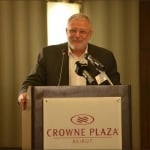
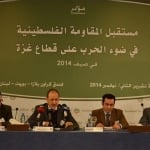
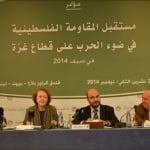
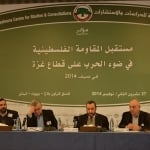
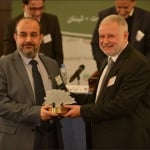
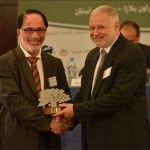
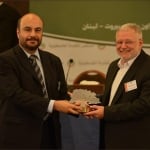
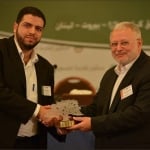
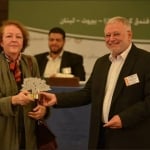
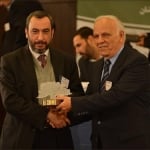
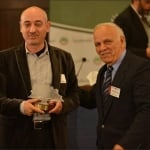
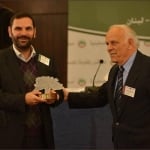
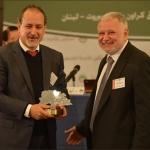
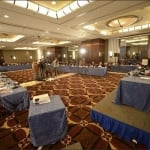

Leave A Comment